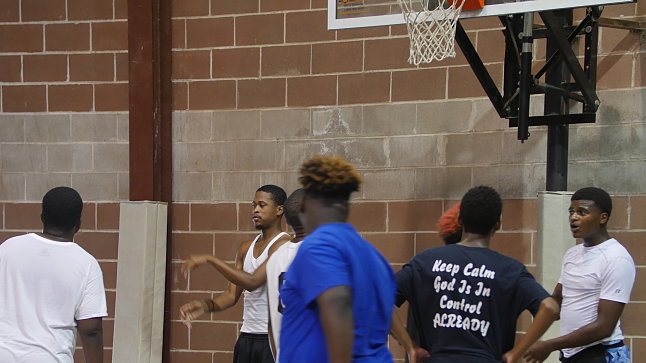Six Strategies for an Evangelistic Gym Ministry

This summer Tabernacle Baptist Church in Dermott opened its first structured gym ministry and have seen 32 children and youth come to know Christ.
Jeremy Hayes, a nursing student at the University of Arkansas at Monticello and a member of the Cooperative Program-funded Baptist Collegiate Ministry (BCM), was a summer missionary who oversaw the evangelism and discipleship of Tabernacle’s gym ministry. Working with Tabernacle was Jeremy’s second experience in gym ministry; his first was with First Baptist Church Monticello.
While Jeremy said he is “a real basic guy” and his approach to gym ministry is simple, here are his pointers for churches building an evangelistic gym ministry:
1. Choose your game
First Baptist Monticello and Tabernacle both focused on only one sport—basketball—but Jeremy recommends that churches choose a sport that appeals to their community, whether it’s soccer, softball, volleyball, or other organized games.
“It’s the game that draws people in,” Jeremy said, “but it gives you the opportunity to share Christ.”
2. Provide a place to play
In his experience, Jeremy learned that using a gym as an outreach tool has less to do with the facility than it does the game. Churches can use their fellowship hall, a playground, or a grass play area. Kids would come to Tabernacle’s gym to play ball even though there was no air conditioning.
“Churches don’t necessarily need a nice facility, just something that gets kids out of the sun,” Jeremy said. “All they’d have is a concrete floor, put a roof over it but with open walls, and get some cold drinks. They would be good to go!”
Tabernacle also had barrels of water and Gatorade for the players and the crowd. Later, Tabernacle opened a snack shack, which Jeremy said “was a huge hit.” The snack shack sold hot dogs, pickles, candy, chips, and popcorn, and all of the snacks were $1 or less. The money the kids spent was used for missions.
3. Set rules
In any sport or game, players need rules for things to run smoothly and to prevent conflict. The same is true in gym ministry. Structure creates an atmosphere for playing and learning.
“The main thing I have to do when dealing with crowds is to lay down the law,” Jeremy said. “You need to have rules in place and let them know there are consequences if they break those rules.”
Jeremy often emphasized respect when he talked with the kids. “I told them, ‘We are opening this facility for you, but you have to be respectful of me and the church if you want to continue using it.’ Once the rules were set and we had a basic structure of play, I could teach them and give devotions.”
4. Teach the basics
Don’t assume that when you are teaching biblical truths and reading Scripture that your audience has heard them before. When Jeremy began teaching, he talked with the kids first about how to pray and why we pray, and who Jesus is and why He died. Jeremy would also ask if they understood and if they had questions.
“I always tried to lower my Christian terminology, too,” Jeremy said. “I avoided using ‘saved’ and words that most believers know.”
Jeremy would then read Scripture to the kids to give evidence for the truths he was teaching, but he encouraged them to study the Bible for themselves.
“One time I gave them the example that you don’t want to be in church and someone teach you the wrong thing,” Jeremy said. “Later I made up a verse that sounded really good, and they were listening and nodding their heads. Then I told them it was made up. That really got their attention.”
5. Don’t forget about bystanders
While the game brings players, the players bring spectators. Jeremy said that the parents, siblings, friends, and girlfriends of many of the basketball players would come to the gym and watch from the sidelines. Jeremy said that the time while the game is going on is the prime time to talk one-on-one and ask, “Do you know Jesus?”
“You get people playing ball, and you work with them, but you have to get on the sidelines and talk to the people watching, too,” Jeremy said. “That’s where 90 percent of the salvations this summer came from—people I talked to on the sideline.”
6. Word of mouth is key
A winning team in a community draws a crowd because people talk about it. If you do a little advertising up front—on Facebook or through community outreach—and people begin to come, then word of mouth will do the rest.
“I would hear the kids tell their friends, ‘Tabernacle has drinks and indoor gaming. It’s legit, and you should come with me,’” Jeremy said. “You could put up flyers and stuff, but if it’s as big a hit as I know it will be, then the kids will advertise for you.”